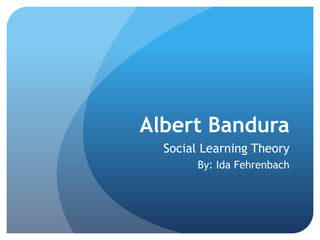Bandura and Social Learning Theories
•Download as PPTX, PDF•
26 likes•49,012 views
Brief explanation and classroom application of Albert Bandura's social learning theory.
Report
Share
Report
Share

Recommended
Recommended
More Related Content
What's hot
What's hot (20)
Social cognitive theory in socio cultural approach to learning behavior

Social cognitive theory in socio cultural approach to learning behavior
Viewers also liked
Viewers also liked (9)
Lev Vygotsky’s Socio-Cultural Theory of Cognitive development

Lev Vygotsky’s Socio-Cultural Theory of Cognitive development
Similar to Bandura and Social Learning Theories
Similar to Bandura and Social Learning Theories (20)
Social psychological theories of aggression - SLT A2

Social psychological theories of aggression - SLT A2
Recently uploaded
https://app.box.com/s/x7vf0j7xaxl2hlczxm3ny497y4yto33i80 ĐỀ THI THỬ TUYỂN SINH TIẾNG ANH VÀO 10 SỞ GD – ĐT THÀNH PHỐ HỒ CHÍ MINH NĂ...

80 ĐỀ THI THỬ TUYỂN SINH TIẾNG ANH VÀO 10 SỞ GD – ĐT THÀNH PHỐ HỒ CHÍ MINH NĂ...Nguyen Thanh Tu Collection
Making communications land - Are they received and understood as intended? webinar
Thursday 2 May 2024
A joint webinar created by the APM Enabling Change and APM People Interest Networks, this is the third of our three part series on Making Communications Land.
presented by
Ian Cribbes, Director, IMC&T Ltd
@cribbesheet
The link to the write up page and resources of this webinar:
https://www.apm.org.uk/news/making-communications-land-are-they-received-and-understood-as-intended-webinar/
Content description:
How do we ensure that what we have communicated was received and understood as we intended and how do we course correct if it has not.Making communications land - Are they received and understood as intended? we...

Making communications land - Are they received and understood as intended? we...Association for Project Management
https://app.box.com/s/7hlvjxjalkrik7fb082xx3jk7xd7liz3TỔNG ÔN TẬP THI VÀO LỚP 10 MÔN TIẾNG ANH NĂM HỌC 2023 - 2024 CÓ ĐÁP ÁN (NGỮ Â...

TỔNG ÔN TẬP THI VÀO LỚP 10 MÔN TIẾNG ANH NĂM HỌC 2023 - 2024 CÓ ĐÁP ÁN (NGỮ Â...Nguyen Thanh Tu Collection
Recently uploaded (20)
80 ĐỀ THI THỬ TUYỂN SINH TIẾNG ANH VÀO 10 SỞ GD – ĐT THÀNH PHỐ HỒ CHÍ MINH NĂ...

80 ĐỀ THI THỬ TUYỂN SINH TIẾNG ANH VÀO 10 SỞ GD – ĐT THÀNH PHỐ HỒ CHÍ MINH NĂ...
Kodo Millet PPT made by Ghanshyam bairwa college of Agriculture kumher bhara...

Kodo Millet PPT made by Ghanshyam bairwa college of Agriculture kumher bhara...
HMCS Vancouver Pre-Deployment Brief - May 2024 (Web Version).pptx

HMCS Vancouver Pre-Deployment Brief - May 2024 (Web Version).pptx
Making communications land - Are they received and understood as intended? we...

Making communications land - Are they received and understood as intended? we...
TỔNG ÔN TẬP THI VÀO LỚP 10 MÔN TIẾNG ANH NĂM HỌC 2023 - 2024 CÓ ĐÁP ÁN (NGỮ Â...

TỔNG ÔN TẬP THI VÀO LỚP 10 MÔN TIẾNG ANH NĂM HỌC 2023 - 2024 CÓ ĐÁP ÁN (NGỮ Â...
This PowerPoint helps students to consider the concept of infinity.

This PowerPoint helps students to consider the concept of infinity.
General Principles of Intellectual Property: Concepts of Intellectual Proper...

General Principles of Intellectual Property: Concepts of Intellectual Proper...
Fostering Friendships - Enhancing Social Bonds in the Classroom

Fostering Friendships - Enhancing Social Bonds in the Classroom
Unit 3 Emotional Intelligence and Spiritual Intelligence.pdf

Unit 3 Emotional Intelligence and Spiritual Intelligence.pdf
Bandura and Social Learning Theories
- 1. Albert Bandura Social Learning Theory By: Ida Fehrenbach
- 2. About Albert Bandura • Born on December 4, 1925 • Canadian, American • Studied at University of British Columbia and University of Iowa. Researched and taught at Stanford University. • Elected president of American Psychological Association in 1974 • Famous for research on social learning theories
- 3. What is social learning? Remember the saying monkey see monkey do? Same concept! Observational learning: Watching actions performed either in a form of media of in real life then mimicking the observed behavior. Bandura’s concept of regulation of human behavior is found in the diagram of triadic reciprocal causation. Behavioral, cognitive and environmental factors all influence learning behavior.
- 4. Research Experiments Bobo the clown Boys and girls watched a video of a person performing violent acts on a blowup clown named Bobo. Use of kicking, punching, and hammering were modeled. When children were then left alone with the same blowup clown they performed the same behaviors they had observed. Watch Bandura and the Bobo experiement
- 5. Still Images from Bobo experiment
- 6. What this means for educators • Model appropriate behaviors for a school environment, realize that your students are watching you constantly. • Watch and listen critically to audiovisuals before using in class. • Do not underestimate how quickly children learn from what they observe! • A funny example...
- 7. Key Concept: Self-Efficacy A person’s belief that they can successfully perform behaviors that will produce desired effects. Judgment of personal capacity. Typically people will not try to do things they do not believe they can do. Self concept arises from past accomplishments. Contribute to academic confidence and success.
- 8. What this means for educators It is important to foster the development of self- efficacy. Create a sense of empowerment in the classroom. Challenge students, and always maintain confidence in their abilities to rise above challenges. Tell them this! Celebrate and acknowledge when children perform to the best of their ability and conquer challenges.
- 9. Applying Bandura’s theories in the classroom Carefully select audiovisuals that are to be used in the classroom. Create a sense of collective-efficacy by emphasizing team work. Set goals for students to accomplish, have them keep a record of these accomplishments. Once a month take the record out and celebrate their hard work. Incorporate technology by putting the students' challenges and accomplishments online on the class website so they can show their friends and family.
- 10. Works Cited Engler, Barbara. Personality Theories: An Introduction. Boston, MA: Houghton Mifflin, 2009. Print. Shelly, Gary B., Glenda A. Gunter, and Randolph E. Gunter. Teachers Discovering Computers: Integrating Technology in a Connected World. Boston, MA: Course Technology Cengage Learning, 2012. Print.